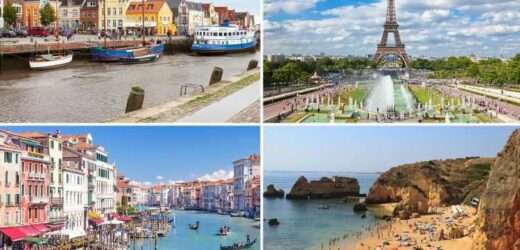FRANCE has hinted its UK travel ban will soon be loosened as an increasing number of countries indicate Brits may soon be welcome.
French ministerial cabinet members have agreed to lift rules preventing some Brits from entering the country, despite more than 330,000 new Covid cases recorded locally.
Spokesperson for the French Government, Gabriel Attal, says essential workers are now permitted to travel to France.
He acknowledged that this will come as relief for many looking to visit France on a working capacity after the "list of compelling reasons, notably professional" was extended.
Many are still eagerly awaiting more information as to when the rules will be changed for tourists.
France Announced the travel ban on December 16, stating that all arrivals must have an "essential reason to travel to, or come from, the UK, both for the unvaccinated and vaccinated".
At the time, this did not include for leisure or professional reasons.
While countries slowly move to scrap restrictions, rules to enter Britain will be eased on Sunday, after pre-departure testing was ditched.
Since Friday, travellers have been able to return to the UK without needing to have a Covid test, provided they are vaccinated.
Most read in The Sun
LAURA MARRIAGE SPLIT A Place In The Sun's Laura Hamilton reveals shock split from husband
I text my dead sister’s number and I couldn’t believe the response I got
Sinead O’Connor’s teen son Shane dies as she pays tribute to ‘light of my life’
Denise Van Outen's ex fiancé responds after it’s revealed she’s ditched him
The isolation rule – which required arrivals to isolate until they received their day two test result – has also been scrapped.
As the UK moves to loosen its expectations of travellers amid the Omicron outbreak, chances at holiday plans going ahead are becoming more likely.
WHERE BRITS STAND
Brits are still banned from a number of countries almost two years after the pandemic began but as a stronger understanding of the risks are considered.
Germany has recently reopened to Brits, after it imposed strict rules before Christmas.
Vaccinated Brits can now enter the country by showing proof of vaccination.
Unvaccinated Brits may only enter Germany if they are a German citizen or resident, if they are married to a German citizen or resident, or if they have an urgent need to travel.
For Brits eligible to enter Germany who are not fully vaccinated, must provide evidence of a negative Covid test result.
They must then spend 10 days in quarantine, with the option of testing to release after five days.
France
France has confirmed that it will loosen travel restrictions for Brits.
However, it is not yet known when restrictions will be lifted.
Currently, only Brits travelling for essential reasons can visit France, regardless of whether they are vaccinated.
Travellers with an essential reason, for example, to see a dying relative, must present a negative PCR or antigen test result taken within 24 hours of departing.
Upon arrival, you must isolate for 48 hours, after which you must should a negative PCR or antigen test to exit isolation.
Without a negative test, you must isolate for 10 days.
Arrivals will need to give contact details to the French authorities and complete a sworn statement confirming they're not suffering from Covid symptoms.
Everyone must wear face masks indoors and on public transport.
Netherlands
The Dutch authorities classify the UK as a 'very high risk area'.
Fully vaccinated Brits must provide proof of vaccination and a negative Covid test.
All travellers from the UK, irrespective of their vaccination status or possession of a negative test, must quarantine for 10 days.
This can be reduced if the person receives a negative test result from the Dutch authorities on day five.
UK nationals who are legally resident in the Netherlands can re-enter the country regardless of their vaccination status, but will need to show a residency permit or a certificate of application.
Spain
Only vaccinated Brits can enter Spain and they do not need to test or quarantine.
To enter, you must show proof of being fully vaccinated, and your second jab must have been at least two weeks before you travel.
Passengers must fill out an online form and may be subject to a temperature check, visual health assessment, or testing on arrival.
Children under the age of 12 do not need to show proof of being fully vaccinated to enter Spain.
Portugal
Brits can enter Portugal however must fill in an online passenger locator form.
To get on the plane, Brits aged 12 and over must have taken an antigen test within 48 hours of departure, or a PCR test within 72 hours of departure.
If your temperature is 38C or over or you show signs of being unwell, you may have to take a Covid test and wait at the airport until you get the result.
Cyprus
The UK is on Cyprus' red list as the country tries to curb the spread of Covid.
All travellers aged 12 and above arriving into Cyprus must complete an online form and have a negative PCR test result taken within the 48 hours before departure.
Travellers must then take a second PCR test as soon as they land at the airport in Cyprus, at a cost of between €15 and €19.
Brits must self-isolate in their accommodation until they receive their test result – which should be within three hours.
If the result is positive, they must remain in isolation and await instructions from the Ministry of Health.
If the result of the airport PCR test is negative, Brits must complete daily self-tests for five days.
If any of those test results are positive, they must contact the Ministry of Health.
After they have been in Cyprus for 72 hours, and provided they have negative self-test results from the previous days, they must have a rapid test at a mobile unit of the Ministry of Health. This is free for those presenting a boarding pass at the testing site.
Children under the age of 12 are exempt from testing.
Italy
Vaccinated Brits can enter Italy without needing to self-isolate.
They must fill in a passenger locator form before arrival and show proof of a negative PCR or antigen test taken within 48 hours before entering Italy.
Unvaccinated Brits must do the same, but in addition, must notify the Italian authorities of their entry into the country.
They must then travel to their final destination in private transport, self-isolate for five days, and take another Covid test at the end of the isolation.
Children under 18 do not need to quarantine if they are travelling with a fully vaccinated parent and have a negative Covid test.
Regardless of your vaccination status, anyone arriving in Italy may be subject to random Covid testing on arrival until January 31.
Children under the age of six are exempt from testing.
Greece
All Brits aged six and above must fill in a passenger locator form before arrival in Greece, and must show proof of a negative PCR or antigen test.
Arrivals into Greece may be required to have a rapid Covid test. If you test positive, you and those you are travelling with will have to self-isolate in a quarantine hotel provided by the Greek state.
The length of time you need to isolate depends on your vaccination status.
US
Vaccinated travellers heading to the United States must show a negative antigen or PCR test taken within one day of departure.
Unvaccinated Brits cannot enter the US.
Face masks are mandatory on planes, trains, buses and at airports.
Turkey
All Brits arriving in Turkey aged six and over must complete an online form.
Those aged 12 and over must then prove that they are either fully vaccinated, recently recovered from Covid, or show a negative PCR or antigen test.
All arrivals will be subject to a medical evaluation for symptoms of Covid, including temperature checks.
Arrivals may also be subject to random PCR testing.
New Zealand
It has been a rather frustrating time for Kiwis stuck overseas hoping to go home to New Zealand.
Prime Minister Jacinda Ardern toyed with the idea of ditching the intense MIQ system currently operating in Aotearoa, however, the Omicron variant has prompted a sense of reluctance to set lenience in stone.
The three-stage border system was expected to allow citizens and visa holders from Australia into the country in January, followed by New Zealanders based elsewhere internationally and then open the border to all tourists.
But since the latest variant, the first wave has been told to continue holding their breathes until at least the end of February.
Undoubtedly, this is expected to push back when the other groups may enter without having to withstand the vagarous quarantine period.
Source: Read Full Article










